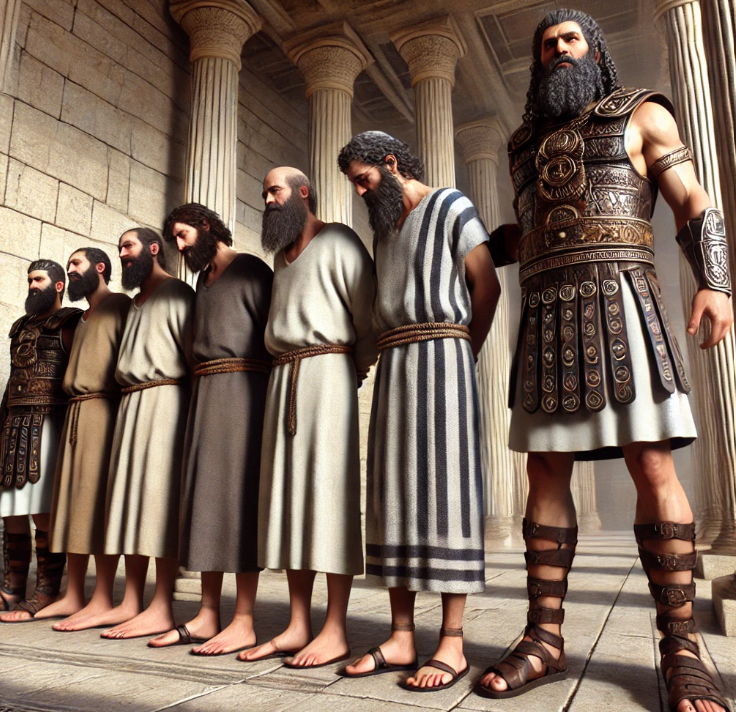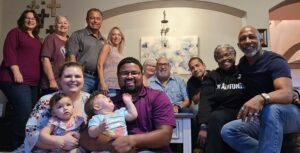2 And devout men carried Stephen to his burial, and made great lamentation over him. 3 As for Saul, he made havoc of the church, entering every house, and dragging off men and women, committing them to prison.
The vile and violent victory of the liars and haters that killed Stephen was the start of an uprising against Greek-speaking Jesus followers in Jerusalem. But in the midst of all the growing animosity toward the first Christians, some people took time to feel. Although it was inconvenient and more than a little dangerous, devout men took time to say “I love you, Stephen” and saw to the burial of his broken body. And they wept greatly for their fallen brother.
The decision to mourn our martyrs matters. In the time intentionally set aside to be sorrowful we recognize the loss, reflect on their light, and thereby also become reinforced in our resolve to live more like them (Ecclesiastes 7:2-4).
Taking time to mourn our fallen heroes, good friends, and light-bearing leaders is part of (1) respecting them, (2) thanking God for their contribution to our lives, and (3) beginning the process of good changes in the heart, and (4) picking up where they left off. As we embrace the loss and think on their legacy, we can be led into deeper commitments, repentance, and revival. For those of us who want to move in the direction of being better persons, good grieving is key. Consider the words of Solomon on the matter:
2 Better to go to the house of mourning
Than to go to the house of feasting,
For that is the end of all men;
And the living will take it to heart.
3 Sorrow is better than laughter,
For by a sad countenance the heart is made better.
4 The heart of the wise is in the house of mourning,
But the heart of fools is in the house of mirth.
The house of mourning, in the passage above, is the place and time dedicated to grieving the loss of someone. We go to that house when we choose to mourn our dead. This is better than trying to cope with their loss through escapes into pleasure or the decision to go to places dedicated to feeding the flesh (house of feasting). Why? Solomon goes on to explain that the dead we mourn have gone where we too are going: “For that is the end of all men,” he says. While we are still alive, we can be fundamentally changed for the better if we will intentionally go look upon the fact that our time is short and that we cannot escape death. When the living look intentionally at the loss of life it affects them profoundly… they taken to heart (Ecclesiastes 7:2).
The decision to mourn the loss of Stephen was a decision to become better men through grief. Their faces and voices visibly expressed the excruciating pain of parting ways with a beloved brother. The text says they made great lamentation over him (Acts 8:2). But notices what Solomon says about this:
3 Sorrow is better than laughter,
For by a sad countenance the heart is made better.
In this moment the mourners are being made better. They are facing facts and their hearts, the place from which spring our words, work (Matthew 12:34; Luke 6:45), and the issues of life (Proverbs 4:23), are being refined.
Questions for Consideration
- Are you taking time to mourn the losses of loved one and important relationships? Why would you intentionally enter the sadness of thinking over someone’s life and the loss? (Ecclesiastes 7:2-4; 1 Corinthians 11:23-26)
- Can you think of someone that you have loss that had a trait that you admired or work that you appreciated? What would it look like for you to embrace the pain of their departure, think soberly about your eventually end on earth, and then prayerfully consider how you might continue their work?
It was an act of real courage to take time to mourn the loss of Stephen. Jewish law forbade funeral observances for condemned criminals; Stephen had been the victim of mob violence and those who stoned him surely viewed him as a blasphemer and law breaker. They will look for his friends, associates, and family. The courage of these devout men is a reminder of the similar valor shown by Joseph of Arimathea and Nicodemus in the burial of Jesus (Matthew 27:57-60; Mark 15:42-46; Luke 23:50-54; John 19:38).
The Leading Persecutor of the Church (Acts 8:3; 26:9-11; Galatians 1:13)
Saul, is at work fanning this flame into a blaze. He leads the charge against the Jesus followers by going methodically from home to home, and from synagogue to synagogue to persecute them. The description of his activities is called havoc in Acts 8:3. It carries the meaning of the damage caused by a wild animal. He reflects on his violence toward the church later in life:
And I punished them often in every synagogue and compelled them to blaspheme; and being exceedingly enraged against them, I persecuted them even to foreign cities. (Acts 26:11, NKJV)
Leading the work of hurting the church was the young man who had stood with the clothes of those who stoned Stephen. He was not content to support Stephen’s death; he obtained permission to pursue people that tried to run away while continuing to promote faith in Jesus:
The prime agent in the repressive campaign was Saul of Tarsus, who now carried into more effective action the attitude to the new movement which he had displayed at the stoning of Stephen. Armed with the necessary authority from the chief-priestly leaders of the Sanhedrin, he harried the church, arresting its members in their own homes and sending them off to prison. A zealot for the ancestral traditions of his nation, he saw that the new faith menaced those traditions. Drastic action was called for: these people, he thought, were not merely misguided enthusiasts whose sincere embracing of error called for patient enlightenment; they were deliberate impostors, proclaiming that God had raised from the tomb to be Lord and Messiah a man whose manner of death was sufficient to show that the divine curse rested on him. (Bruce, 1988, p. 163)
From his perspective the Jesus followers had to be stopped. And he was going to do it.
Moving On with the Message (Acts 8:4)
4 Therefore those who were scattered went everywhere preaching the word.
The consequence of the persecution is a scattering of the believers (Acts 8:2, 4). With their scattering the word of God is also scattered. The gospel of Jesus Christ is now being preached everywhere. In particular it is now being proclaimed in those places (Judea and Samaria) that Jesus wanted to reach (Acts 1:8).
They were scattered like one scatters seed. But scattered seeds grow, Christian. See the irony! The persecution and scattering of the Christians only led to the growing of the movement. With the dispersal of the Hellenist Christians, the fulfillment of the second phase of Jesus’ commission began—the witness to all Judea and Samaria (8:1b; cf. 1:8).
Learn to look at life through the lens of the Lord’s program. In that view nothing is wasted and the things that seem like setbacks are actually used to spring forward in doing His will (Romans 5:1-5; 8:28).
The Principle of Persisting (Acts 8:4)
The nation of Israel had been dispersed among the Gentiles (James 1:1). Through that scattering of God’s people other nations came to know about God’s plan to bring them salvation through the King of the Jews (Matthew 2:1-2; John 4:19, 25). Now the new people of God are being dispersed among the nations. But what will they do among the nations? Be witnesses, of course!
The church had grown extensively; it was to grow more than ever, but now by being spread abroad. Luke’s figures and further notes about the growth make the estimate of 25,000 believers in and near Jerusalem at the time of Stephen’s martyrdom seem conservative. The persecution aimed to destroy the infant church; in the providence of God it did the very opposite. It started a great number of new congregations especially in all of Palestine, each becoming a living center from which the gospel radiated into new territory even as Jesus had traced its course by adding after Jerusalem “all Judea and Samaria” (1:8). (Lenski, 1961, p. 311)
Over the nearly two years since Pentecost (33 AD) thousands of Jesus followers have been trained by the apostles to pursue holiness, present the gospel, and mentor others in following Jesus. They have been empowered, equipped, and educated in evangelism and discipleship. It is time for the highly trained church to be deployed. Luke says that the response of the church was logical; Therefore (οὖν) those who were scattered went everywhere preaching the word (Acts 8:4). What else could they do? Witnessing, for the Christian, is not activity; it is an essential identity (Acts 1:8; Deuteronomy 6:4; Isaiah 43:12; 44:8). When they could not be accepted for who they are, they go elsewhere in their new identity.

Figure 2 – Dr. Alejandro Mandes talks with our youth about Joshua 1:8-9. He comes to us in
his identity as a person who explains the word of God and promotes faithfulness to Christ.
How would you respond? Before you answer, consider what Jesus means by giving the Holy Spirit. It was not to simply facilitate activity; he baptized the new believers of Jerusalem into Himself to give them a new essential identity:
- Therefore, if anyone is in Christ, he is a new creation; old things have passed away; behold, all things have become new. (2 Corinthians 5:17, NKJV)
- For in Christ Jesus neither circumcision nor uncircumcision avails anything, but a new creation. (Galatians 6:15, NKJV)
That identity is not a function of location. They are new creations wherever they go. And so the new creation of God has just been scattered abroad. This is what Jesus wanted (Matthew 10:23). The setback of persecution was a setup to spring forward in the mission of taking the gospel to the world.
Questions for Consideration
- Am I regularly taking time to think about what Christ did for me?
- Can I see God’s hand in moving me from one place to another?
- How can I bring the message to the places He has moved me?
References
Bruce, F. F. (1988). The Book of the Acts. Grand Rapids, MI: Wm. B. Eerdmans Publishing Co.
Lenski, R. C. H. (1961). The Interpretation of the Acts of the Apostles. Minneapolis, MN: Augsburg Publishing House.












